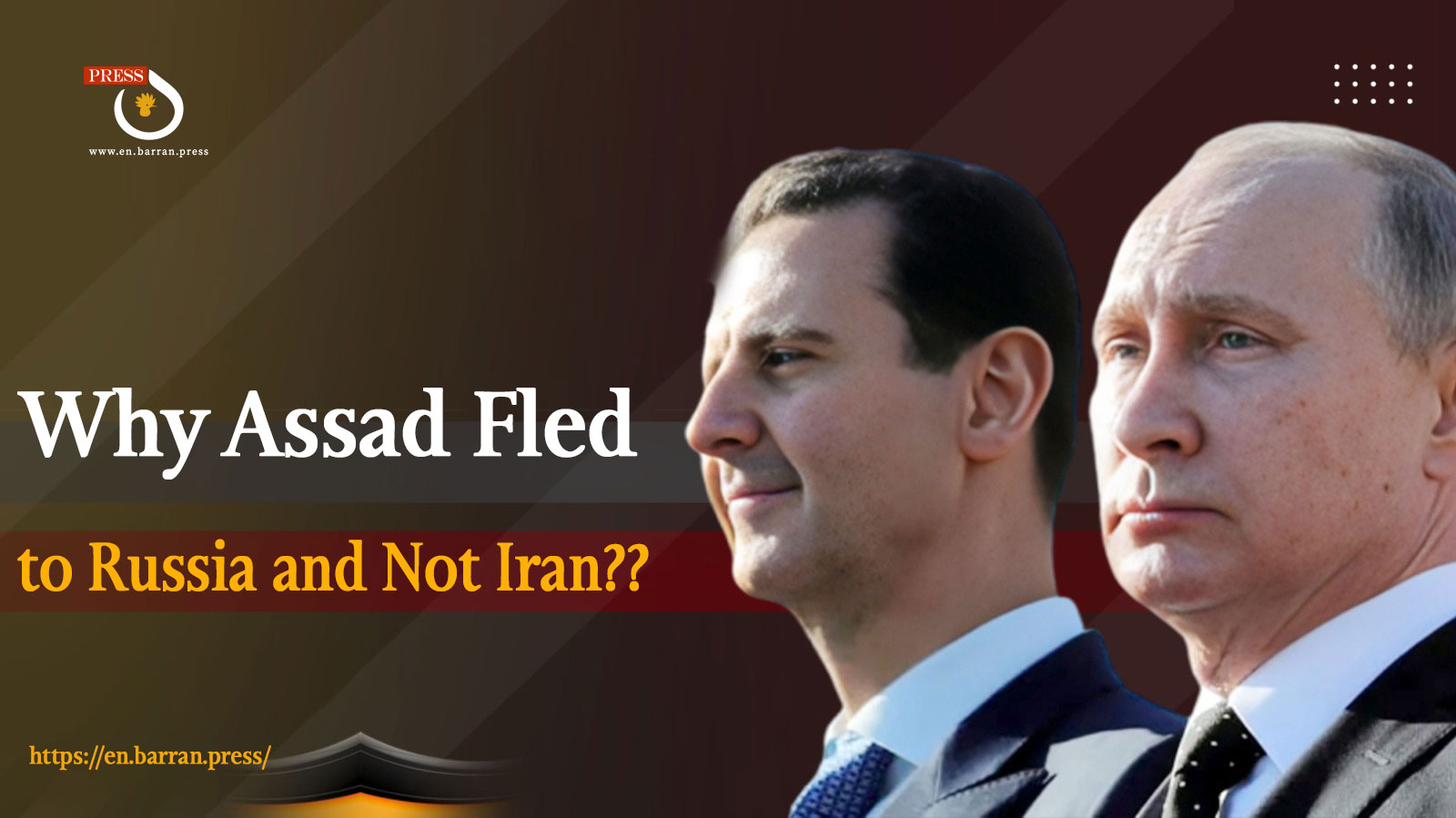


Barran Press - Ammar Zu'bul
With the Syrian opposition's announcement early Sunday, December 8, 2024, of their control over Damascus, attention turned to the fate of President Bashar al-Assad and the country he would seek refuge in. Speculations centered on Russia and Iran, the strategic allies of the Syrian regime for decades.
Later that Sunday, Russian news agency "TASS" revealed, citing a Kremlin source, that former Syrian President Bashar al-Assad was in Moscow and had been granted asylum in Russia.
According to the agency, Assad and his family arrived in Moscow on humanitarian grounds and were granted asylum.
Why Russia?
Discussing why Assad chose Russia over Iran, Dr. Adel Dashila, a researcher at Columbia University's Middle East Research Center, stated that Assad opted for Russia because it is a major power and a permanent member of the UN Security Council.
Dashila told "Barran Press" that even if Russia later faced pressure to hand over Assad, it might not do so, whether to the International Criminal Court or to Syrian internal courts.
Furthermore, Dashila believes that Russia secured Assad's exit from Syria, ensuring his safety from any targeting. In his opinion, Iran has become a "fragile regional state" that would be unsafe for Assad to live in.
"Iran is not a strong state and might abandon him at any moment, especially since he is accused of colluding with the Zionist entity to kill several Iranian Revolutionary Guard commanders during their stay in Damascus in the past," he added.
No Safety in Iran
Dashila also pointed out Iranian accusations against Assad of colluding and providing coordinates or similar information to Israel for strikes against Iranian leaders. Hence, "Iran is not a good option for him on a personal, political, or security level."
"Even economically, Assad is not safe, as he has money he smuggled out. Therefore, seeking asylum in Russia was the best option for him," Dashila explained.
Legal Evasion
Dashila scoffed at the Russian Foreign Ministry's statement that it granted Assad and his family humanitarian asylum.
"After the massacres, they called it humanitarian asylum, but it is a cover for protecting a head of state," he said, adding that "humanitarian asylum is a way to evade legal consequences in the future."
He continued, "It's hard to predict whether former President Bashar al-Assad will face fair trials, but there might be negotiations about his political future, especially if understandings are reached between the incoming Syrian government and Russia."
For now, "No one can predict the man's future regarding his handover, but his political future is over," Dashila said, indicating that "his handover to justice, trial, or even recovery of funds is left for the coming days."
Only Exit
Dr. Ali Al-Zahab, a Yemeni researcher in military and strategic affairs, said that Russia was the only viable exit for Bashar al-Assad from Syria.
"Russia is the most reliable and has a historical friendship with the Assad regime, both the father and the son. At the same time, Russia has a base in Tartus," Al-Zahab told "Barran Press." He added that most of Syria's weaponry is Russian, indicating deep-rooted relations between the two regimes.
He questioned, "Where else would Assad go? There is no Arab country that can receive him." Additionally, "Iran is no longer a suitable refuge."
Historically, "No Arab leader has ever sought refuge in Tehran, no matter how strong their relations," he said.
Political Leverage
For Russia, having Assad in Moscow provides political leverage, Al-Zahab said.
He believes the "Syrian crisis remains wide open," and that "Moscow will not easily give up this card as part of its influence in the warm waters of the Mediterranean."
"There are ongoing issues for Russia, including the Ukrainian war and American influence and intervention in Ukraine and the Middle East," he told "Barran Press."
"The Syrian crisis is one of the cards the West uses against Russia and vice versa," Al-Zahab explained.
Historical Alliance and Strategic Choice
Afrah Nasser, a researcher at the Arab Center in Washington, noted that Assad's choice of Moscow over Iran stems from the historical alliance between Syria and the Soviet Union during the Cold War, which strengthened military, educational, and cultural ties between the two countries.
"Russia emerged as a strong supporter of the Assad regime during the Syrian civil war," Nasser told "Barran Press," referring to the events since 2011 and Russia's intervention to support Assad.
This made Russia a "trusted haven for the Syrian elite, all allies of the regime," she added. Furthermore, Moscow's focus on its war in Ukraine and the declining influence of Iran's allies in the region, especially Hezbollah's recent setbacks, reduced Assad's options, making Russia the most strategic choice.
Fear and Estrangement
Journalist and researcher Adnan Al-Jabri believes Assad fled to Russia out of fear that the noose tightening around his neck would also ensnare the entire "Axis of Resistance," including Iran (the leader of the Axis).
"Assad sees that Iran will be next, so he chose Russia," Al-Jabri told "Barran Press." This choice "reflects the estrangement or lack of alignment in policies or viewpoints between him and the Iranian regime in recent times."
Al-Jabri believes that "Assad might fear being assassinated in Tehran as the regime there wants to close this chapter."